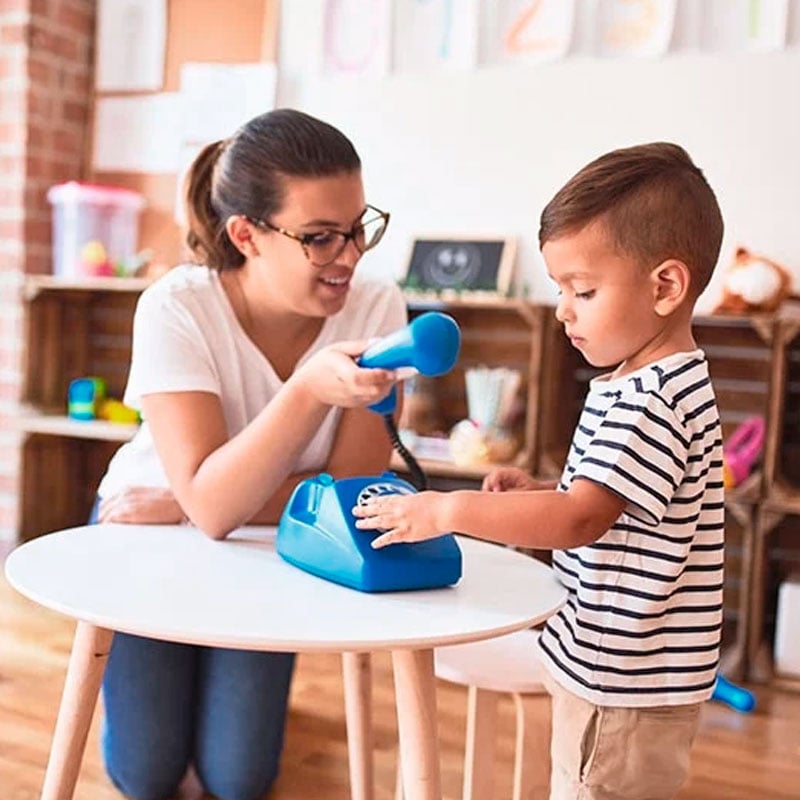Third Year Milestones


In the third year of life, your toddler continues their journey toward mastering their developmental milestones. Between the ages of 30 months and 36 months, your toddler will be learning skills that empower their independence and new skills.
Let’s explore the key developmental milestones your toddler should reach during this time, and what you can do to support their development in the third year.

Your Toddler’s Milestones at 30 Months Old
Fine and Gross Motor Skills
- Jumps with both feet off the ground
- Takes off loose or simple clothes on their own
- Turns doorknobs or unscrews loose lids
- Turns the pages of a book during reading time
Speech and Language Skills
- Knows and uses about 50 words
- Says two or more words to make simple sentences
- Uses personal pronouns like “I,” “we,” “mine,” etc.
- Names the people or things in books when you point and ask what they are
Cognitive Skills
- Plays pretend with toys
- Follows simple two-step instructions, like “Close the door and take off your coat.”
- Recognizes one or more colors by name
- Able to solve simple problems, like standing on a chair to reach something high up
Social and Emotional Skills
- Plays around other toddlers and may play with them
- Follows simple routines like cleaning up after playing with toys
- Shows off their new skills and wants you to watch

Your Toddler’s Milestones at 36 Months Old
Fine and Gross Motor Skills
- Puts on some loose clothes on their own, like pants or a dress
- Strings large beads or noodles onto yarn or string
- Can draw a circle (even if you have to show them how)
- Can pedal a tricycle or use a balance bike
- Walks up stairs one step at a time
Speech and Language Skills
- Speaks clearly enough for others to understand most of the time
- Knows their first name
- Has simple conversations with you and other family members
- Asks lots of questions
- Says what’s happening in a picture when asked
Cognitive Skills
- Avoids danger when you warn them, like a hot stove or pan
- Starts to understand time (morning, afternoon, and night)
Social and Emotional Skills
- Sees when other children are around and wants to play with them
- Calms down shortly after you leave (when at daycare, with a babysitter, etc.)
Feeding Skills
- Self-feeds with utensils, though may still use fingers
- Drinks from a cup without a lid without spilling
- Chews and swallows food of different textures without choking
How to Help Your Toddler Achieve Their Third-Year Milestones
Supporting your toddler’s development during their third year will help them gain the skills they need for lifelong success. Here are some practical tips to help your toddler achieve their third-year milestones:
Do Activities That Require Fine Motor Skills
As your child gets older, they become more able to practice their fine motor skills. Give them time each day to practice these skills through coloring with crayons or markers, building with blocks together, or working on puzzles with large pieces.
Play Games Together
Playing and exploring are great ways for your toddler to build their gross motor skills. You can create a simple obstacle course inside or play games like Simon Says, catch, or hide and seek to encourage movement for stronger gross motor skills.
Engage Their Imagination
Reading, singing, and imaginative play are great ways to practice speech and language skills. Read books together and ask them questions about the story and the pictures, teach them simple nursery rhymes, and play pretend with them with their toys to encourage their speech and language development.
Facilitate Social Skill Development
Playing with children their own age is a great way for your toddler to build key social and emotional skills like taking turns and empathy. Arrange playdates with other toddlers, take trips to the park, or check out local events for toddlers in your community where your child can play with other toddlers.
Let Them Participate in Mealtimes
Children learn a lot from imitating you and the other people in their life. By letting them participate in meal preparation, you can build their interest in foods with different tastes and textures to expand their palate. Allowing them to use utensils and drink from cups without lids (even if they make a mess occasionally) can encourage them to keep building their feeding skills as they imitate how you eat and drink.
Encourage Them to Solve Problems
Letting your child face and figure out problems on their own is good for their cognitive development. If your child has a problem like they can’t reach something they want, you can ask them questions to help them better understand the problem and what they could do to solve it. By doing this, you help them learn how to problem-solve on their own.
Avoid Screen Time
Children learn best by playing and talking with others, not by watching TV. While some children’s programs can have educational value, it’s best to limit screentime to no more than 1 hour per day with you or another adult present to answer any questions and participate.
Reach Out to Let’s Communicate for Personalized Support
Remember, every child develops at their own pace, and giving your toddler the chance to practice their new skills can help them succeed.
If your child needs additional support, call Let’s Communicate Pediatric Therapy Services at (678) 963-0694 to schedule an evaluation. We’ll help your child achieve their third-year milestones for a successful and confident life.
